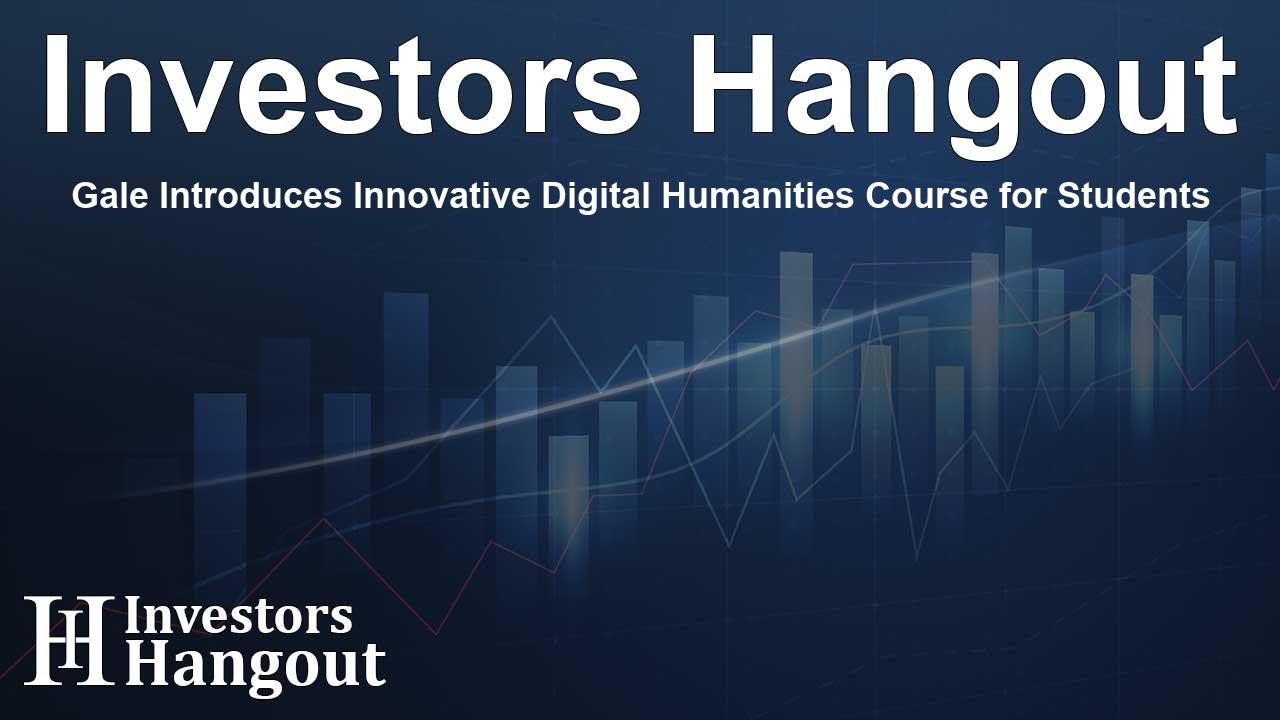Gale Introduces Innovative Digital Humanities Course for Students

Gale's New Course Empowers Undergraduates in Digital Humanities
Gale, a segment of Cengage Group, takes a significant step in education by introducing an online course titled "Introduction to Digital Humanities." The course aims to teach undergraduate students essential digital and data literacy skills through hands-on experience with primary source archives alongside text and data mining tools. With this initiative, Gale is setting a new standard for digital humanities education.
Course Overview: A Comprehensive Learning Experience
The "Introduction to Digital Humanities" course allows instructors to seamlessly integrate various modules or specific activities directly into their curricula. Designed for ease of use, the course is free and accessible in beta within the Gale Digital Scholar Lab, ensuring that instructors and students benefit at no extra cost.
Essential Skills for Modern Education
This course addresses a rising demand in higher education as a recent survey highlighted that faculty members in the humanities and social sciences expressed significant interest in topics like "Critical Thinking with Primary Sources" and "Introduction to Text and Data Mining." In response, Gale collaborated with educators to structure this course content precisely around these interests.
Modules that Shape Future Scholars
The course comprises six meticulously crafted modules that guide students through the entirety of the digital humanities workflow, from initial research phases to final project presentations. The modules include:
- Using Digital Archives: This module covers the basics of engaging with digital primary source collections.
- Mining Text and Data: Students learn techniques to extract insights from large data sets effectively.
- Building Content Sets: This teaches students to curate and organize relevant primary sources for their projects.
- Cleaning Data: A critical step in the analysis process that focuses on preparing data by eliminating irrelevant elements.
- Analyzing Data: Students explore various methods and tools for data interpretation.
- Creating and Publishing Projects: This module instructs students on presenting their findings effectively to different audiences.
Value for Educators and Institutions
Dr. Sarah Ketchley, a senior digital humanities specialist at Gale, highlighted the course's role in revolutionizing how instructors approach teaching digital humanities. With the course offering ready-to-use materials, educators can more easily implement vital techniques for text and data mining, streamlining the course development process.
Furthermore, the course aligns its content with Bloom's taxonomy, ensuring that students not only engage with but also understand critical educational goals. This alignment fosters the development of key digital skills and critical thinking capabilities, which are becoming increasingly essential in various professional fields.
The Future of Digital Literacy
The skills students acquire from the "Introduction to Digital Humanities" course are not only crucial for their academic progress but are also in high demand by employers seeking graduates with a strong foundation in digital literacy and analytical thinking. Students will leave the course equipped to utilize text mining tools proficiently, analyze computational results, and engage with digital archives critically.
Commitment to Improvement
Recognizing the importance of continuous development, Gale invites feedback from participating faculty and librarians. This input will be vital in refining the course and ensuring it meets the evolving needs of educators.
Showcasing at Academic Conferences
Gale plans to feature this groundbreaking course at various academic conferences, enhancing visibility among prospective users and providing opportunities for direct engagement with educators and institutions interested in adopting the course materials.
Frequently Asked Questions
What is the focus of Gale's "Introduction to Digital Humanities" course?
The course centers around teaching critical digital and data literacy skills using primary source archives and tools for text and data mining.
How many modules does the course contain?
The course comprises six modules, each designed to provide in-depth learning on different aspects of digital humanities.
Who developed the course content?
The course was developed with input from educators actively working in the field of digital humanities, ensuring it meets the needs of instructors and students.
How can instructors access this course?
The course is available for free within the Gale Digital Scholar Lab for instructors interested in integrating it into their courses.
What are the broader implications of this course?
This course aims to enhance digital literacy in students, preparing them for both academic and professional challenges in the humanities and beyond.
About The Author
Contact Olivia Taylor privately here. Or send an email with ATTN: Olivia Taylor as the subject to contact@investorshangout.com.
About Investors Hangout
Investors Hangout is a leading online stock forum for financial discussion and learning, offering a wide range of free tools and resources. It draws in traders of all levels, who exchange market knowledge, investigate trading tactics, and keep an eye on industry developments in real time. Featuring financial articles, stock message boards, quotes, charts, company profiles, and live news updates. Through cooperative learning and a wealth of informational resources, it helps users from novices creating their first portfolios to experts honing their techniques. Join Investors Hangout today: https://investorshangout.com/
The content of this article is based on factual, publicly available information and does not represent legal, financial, or investment advice. Investors Hangout does not offer financial advice, and the author is not a licensed financial advisor. Consult a qualified advisor before making any financial or investment decisions based on this article. This article should not be considered advice to purchase, sell, or hold any securities or other investments. If any of the material provided here is inaccurate, please contact us for corrections.
